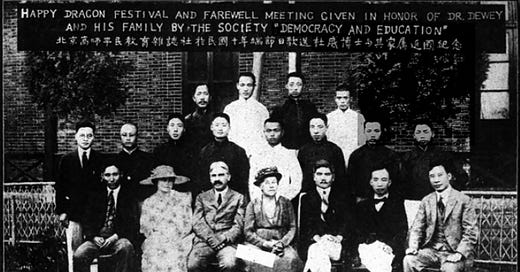Democracy, a Common Faith
"Truth is what works," say the Pragmatists. But for whom?
Last week I introduced my students to one Pragmatist provocation that “truth is what works.” One of my students asked “Can an authoritarian country work better than a democracy?”
Almost without thinking, I responded that I was so committed to the basics of democratic life—free speech, political equality, democratic deliberation, popular sovereignty—that no matter what other metric we considered, that regime would auto-fail my own democratic tests.
As best I understand the language of philosophers, this means I have a deontological commitment to democratic values that overrides consequentialist questions. Put another way, democratic means are more important to me in some ways than the ends they produce. But this, I explained to my student, is an act of faith. That faith is reflected in the beginning of the US Declaration of Independence, in which Jefferson writes that we hold it self-evident that all are created equal, endowed with certain unalienable rights. Jefferson did not attempt to argue that human equality was true—how could he, when he was driven to Philadelphia by people he had enslaved? Rather, he set equality up as a commitment that others must similarly agree to hold as self-evident.
But democracy isn’t self-evidently better to all of my students. It does not make its own, silent case. And there are other models out there competing for supremacy, including from China, which promotes its own model as a way to weaken the US-dominated arrangement of world affairs.
One way to push back against this threat to democracy is to amend the Pragmatists’ initial claim that “truth is what works,” with its corollary, “for whom?” Autocratic regimes work for a subset of citizens, but certainly not for most of them. Democracies do not operate perfectly, but their values allow for, and even demand, effort by citizens—not subjects—to make the more perfect. Pragmatist John Dewey, who lectured in China in the 1910s and 1920s and became a celebrity known as “Mr. Democracy” writes in A Common Faith,
"No matter how much evidence may be piled up against social institutions as they exist, affection and passionate desire for justice and security are realities in human nature.... Human beings have impulses toward affection, compassion and justice, equality and freedom. It remains to weld all these things together."
The ideal democracy gives space to the pursuit of these impulses; the ideal autocracy does not. A Common Faith is not explicitly about democracy but it does argue that the space for positive, hopeful action is between the actual and the ideal, echoing an idea often attributed to the Christian writer St. Augustine that hope springs from “anger at the way things are, and courage to see that they do not remain as they are.”
For whom does democracy work? And for whom does autocracy work? Here is a thought experiment inspired by philosopher John Rawls: imagine coin toss, where heads meant that you would be reincarnated as a random citizen of American; and tails that you would be reincarnated as a random citizen of China. Which would you pick? And in honor of the Pragmatists, what does your reaction to this question say about what is necessary for us to get closer to the democratic ideal?
—
Postscript: For more on John Dewey, check out the Marginalian’s write-ups of Democracy and Education and How We Think, both of which I enjoyed better than A Common Faith. I had hoped that in A Common Faith John Dewey would make explicit that democracy could be our common faith. The book’s three essays load the bases for that, but there’s no clean-up. I suppose, as Dewey says in the second essay, “It remains to weld all these things together.”
Image: John Dewey and the Beijing Normal University’s Society of Democracy and Education, 1921. Image credit Liu Xing.





Thank you for this space and commentary Dr. Hand!
In response to John Rawls' very poignant question, I would choose to be reincarnated as a random citizen of America ... however, I wonder what an anonymous survey of 100 random Americans citizens and 100 random Chinese citizens would yield? Personally, I would assume most would choose the American option; although, I am very often surprised to find the actual answers to questions I am sure I know the answers to.
I found it a very intriguing and convincing argument that, "The ideal democracy gives space to the pursuit of these impulses [affection, compassion and justice, equality and freedom]; the ideal autocracy does not."
I wonder on the other hand if any are swayed by the possibility that a person reincarnated as a random citizen of a perfect democracy may have a greater chance of living near or below the poverty line (or without health insurance, etc) than a randomly reincarnated citizen of an autocracy (assuming Communism exists as an autocracy)? Disclaimer: This possibility may not exist as I am admittedly not completely sure what a perfect democracy or autocracy has to say about this concept.
Thank you sincerely for the thought provoking and educational exposition Dr Hand. I think these types of thought exercises and discussions help to simultaneously clarify our own ideas and bring us together.